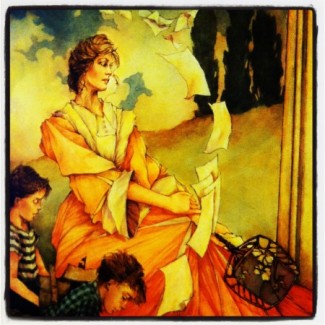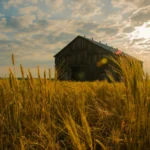Rock Island, IL
Shelley claimed that Mont Blanc had “a voice . . . to repeal / Large codes of fraud and woe.” An exacting technician and tremendous versifier, Shelley was nevertheless the author of several of those large codes. He made great music—great music—but sometimes greater mischief.
Yet let no man in a summer mood injure the dead. Leave it at great music for a Wednesday in May.
May! Month of the darling buds, of the incomparable morel mushroom, of the early lettuces, of rocket, of the burgeoning radish and the incipient strawberry, of dandelions and dandelion wine, of girls in white summer dresses, of yellow air and windowpanes and seed head and sinuses and fits of sneezing. May: the season of fraudulent codes repealed!
In these parts May ends with a week or so of gnats—damn them to hell unless you’re a house sparrow or a barn swallow!—but still it is a time of languor, of tall sweaty G&Ts and tangy barbequed ribs on screened-in porches, of leisurely reading and re-reading, of remembered verse “midst the gorgeous blooms of May” that call to mind “the painted tribes of light” and “the modest flower / That made the woods of April bright.”
The boys of summer are at it, thank God, though the freaks of the NBA (Not Basketball Anymore) are too. Devil take them and their million-game season. Farmers’ markets are a-swarm with people, some of them bronzed and carelessly clad in white summer dresses, and bike paths are heavy once again with traffic. The odd reel mower, rhythmic and musical, sends a shower of grass clippings up into the wet morning air, and the stack of summer books grows skyward like Jack’s beanstalk.
The fraud that all this repeals goes by the name of “assessment,” “outcomes,” “student learning,” “student-centered learning,” “faculty development,” “curricular reform,” and other synonyms for the whole boatload of sensitive bullshit.
Honestly! How does anyone keep from going postal while working on anything but the academic calendar? May is that month when scores of us are poised at the tip of a compressed and barely restrained but very dangerous spring. One vibration too many and teeth could be severed from their roots, heads from their necks, and wankers from their wankish neckties and their wankish desk chairs in their wankish offices.
I think old Henry Adams was right: three years of this unfits a man for any other kind of work. God didn’t put twelve months on the calendar so we could work them all.
But now, outside, thunder rolls and rolls again. Rain taps away at the rooftop. Soon the cicadas will grind out their metallic song, drowning out and then giving way to the crickets and to the trilling frogs oblivious of unfrogly things, as the incomparable Peter Mathiessen once wrote.
Mathiessen! Put him on your summer list, though you’ve read him a million times!
And summer—summer! It’s like “that unfailing sense of being young,” as Philip Larkin said in a different context, that sense that spreads out “like a spring-woken tree”; it’s like that “certainty of time laid up in store,” is it not?
Is it not?
Alas, no.
Time laid up in store, as Larkin knew, as all true poets know, is illusory. For, day by day, hour by hour, summer also brings the sense of time running out. By the minute it shortens and dies and brings us nearer our own demise. It reminds us that we too among the wastes of time must go. What it means to be fifty summers nearer death than when I first began …
Summer, you fooler.
And there, in Bradbury’s Dandelion Wine, is Leo Auffmann looking in the window of his own house just after his Happiness Machine has gone up in smoke. His wife, who has been ungently reminded inside the machine that she isn’t ever going to Paris and that the house and children still need tending to, is unbegrudgingly taking a pot roast out of the oven, because that’s what you do when you’re Lena Auffmann. His children are playing chess, cutting out paper dolls, playing with the electric train, because that’s what you do when you’re a child of Lena and Leo Auffmann.
“Sure,” [Leo] murmured. “There it is.” And he watched with now-gentle sorrow and now-quick delight, and at last quiet acceptance as all the bits and pieces of this house mixed, stirred, settled, poised, and ran steadily again. “The Happiness Machine,” he said. “The Happiness Machine.”
Embrace your life, admonished Thoreau. It’s not so mean as you are.
Bewitching summer, look not so sheepish. Look not so like a guilty thing disturbed. There’s witchcraft in all the seasons—the season of yellow mists, the season of the great snows, the season of the dearest freshness deep down things. They all preach death even as they all sing renewal, each in its own time and key signature. It takes the Lena Auffmanns to remind the Leos of this world that no one wants a sunset to last. “Two things you did you should never have. You made quick things go slow and stay around. You brought things faraway to our backyard where they don’t belong.”
Our backyard: where summer is and happens and passes and departs and disappears. Our backyard—and our front porch too.
But “oh, the luxury of lying in the fern night and the grass night and the night of susurrant, slumberous voices weaving the dark together.”
You said it, Mr. Bradbury. Repeal them, sir. Repeal the large codes of fraud and woe.






2 comments
robert m. peters
Mr. Peters,
If the Peters clan were elves, you would be descended from the High Elves, well gifted with the lilt of poetic prose while I, on the other, hand would be descended from the more earthy and pedestrian Woods Elves. Yet your very distant cousin, likely several times removed at that, relishes that which you wright in writing and concurs with all that you capture in the portrait of summer which you render above.
Stephen
Mr. Peters, your seasonal essays are the best pieces to ever appear on FPR. Thanks for sharing them with us.
Comments are closed.